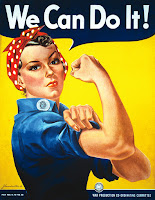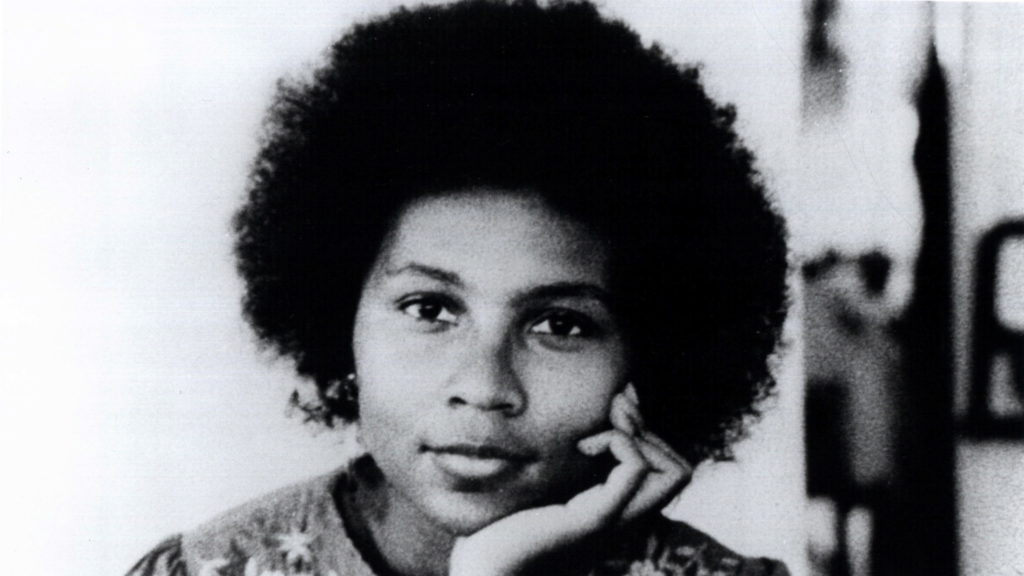 This advertisement advertises Tide - a laundry powder launched in 1946 - it was used throughout the 1950s and the advert has typical attributes of behavior of the time. Before WWII it was frowned upon for women to have jobs, however once WWII took place women alike were encouraged to work in factories that created rivets, bombs and other weapons. Rosie the Riveter contrasted with the post-war representation of women.
This advertisement advertises Tide - a laundry powder launched in 1946 - it was used throughout the 1950s and the advert has typical attributes of behavior of the time. Before WWII it was frowned upon for women to have jobs, however once WWII took place women alike were encouraged to work in factories that created rivets, bombs and other weapons. Rosie the Riveter contrasted with the post-war representation of women. Once the war was over there was slit leeway for women to be employed, however, only "women's" jobs. Although it was still frowned upon at this time; women could work as teachers, receptionists and assistants but still attitudes withheld them from being successful. Also during this time, when soldiers returned, there was an instant baby boom. The combination of this and the "white flight" created the suburbs, a network of houses where families would live. Instead of employing women into jobs, society dictated that women should become housewives spending all day cleaning their house, looking after children and making sure they looked visually pretty for husbands and fathers. Tide's advert reflects these attitudes in this consumer culture. The women advertising the product creates unrealistic representations of women with perfect skin, make-up, hair and figure which has been created by society's attitudes.
Once the war was over there was slit leeway for women to be employed, however, only "women's" jobs. Although it was still frowned upon at this time; women could work as teachers, receptionists and assistants but still attitudes withheld them from being successful. Also during this time, when soldiers returned, there was an instant baby boom. The combination of this and the "white flight" created the suburbs, a network of houses where families would live. Instead of employing women into jobs, society dictated that women should become housewives spending all day cleaning their house, looking after children and making sure they looked visually pretty for husbands and fathers. Tide's advert reflects these attitudes in this consumer culture. The women advertising the product creates unrealistic representations of women with perfect skin, make-up, hair and figure which has been created by society's attitudes.Liesbet Van Zoonen was a feminist who fought against these attitudes and stereotypes. She pointed out that although women could eventually have the 'perfect' family and the 'perfect' house, there is still a 'hole' in there lives which isn't filled. The film 'Mona Lisa Smile' looks at this issue. It shows how these women in this society enjoyed an education and how they would like to go out into the world and have the same opportunities as men. Van Zoonen fought for a non-sexist society and for media to contribute to social change by representing women in non-traditional roles and using non-sexist language. She talks about this in her book "The Feminine Mystique" which has inspired many feminists thought it's publication.
Bell Hooks is another feminist who talks about how lighter skinned women were considered more desirable and fit better in western ideology of beauty. This is supported by the 'white flight' and is reinforced by the advert for Tide. It shows how the modern woman of the time was depicted as.
The target audience could be housewives and husbands. The advert appeals to housewives as it applies with the idea of 'Keeping up with the Joneses' as it is supposedly 'the next best thing' that the perfect woman that is depicted has it too. Husbands would also pick up that it is 'what women want' suggesting that it is the 'perfect' gift.
Uses and Gratification theory can be applied to the advert. The audience demographic demographic is constructed through the woman drawn. Women of the time are supposed to personally identify with her as future or current housewives who can identify the connotations given by the advert which will create the feeling that they have to buy the next best thing.
Stuart hall's reception theory can also be applied to Tide. The use of the woman being indirect to the audience connotes that he relationship with the Tide powder is of upmost importance further creating the sense of 'keeping up with the Jonses'. The dominant or hegemonic encoding of the advert's primary message and expectations is to be received by housewives.
This is idea can also be reflected in Cultivation theory- George Gerbner. Advertising developed significantly during the 1950s, in the late 1970s Gerbner commented on how these media texts affected audiences. Tide cultivates the idea that it is the best brand and that nothing cleans better or more is more desirable than Tide. Levi Strauss's Binary Opposites theory can be applied to the selling points on the page- 'cleanest' and 'whitest' instantly dissociates dirtiest and darkest to the cultivated audience.








